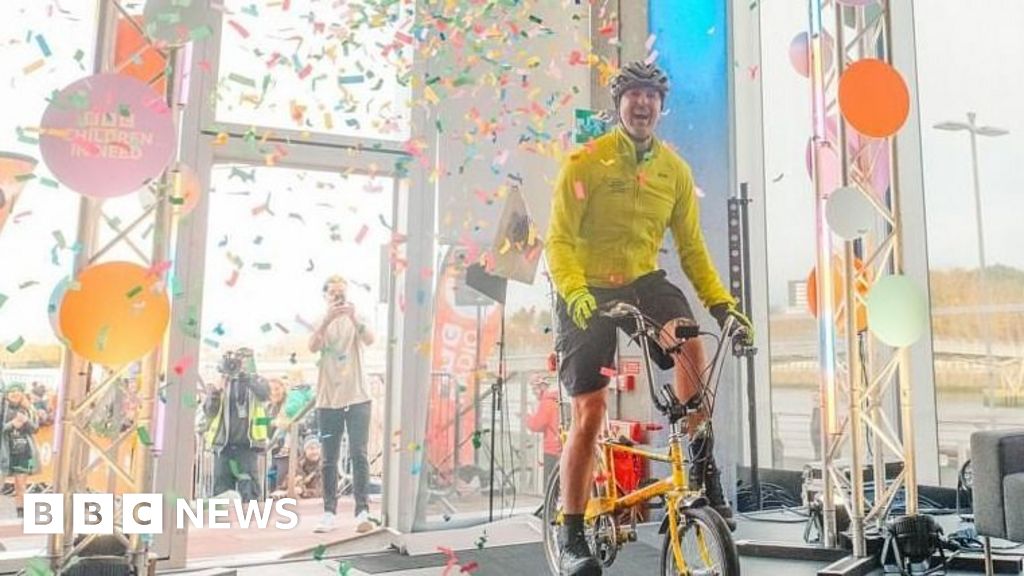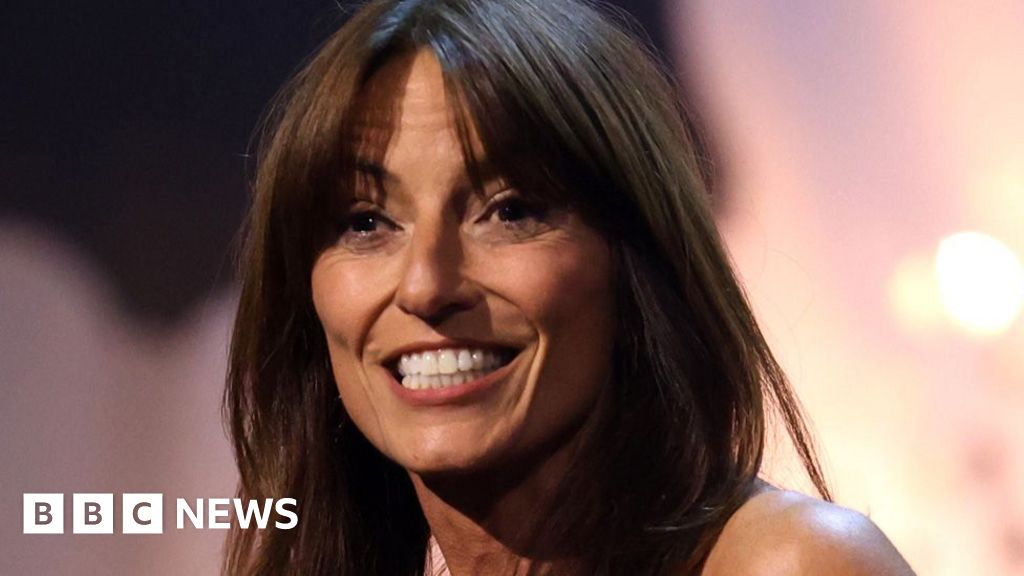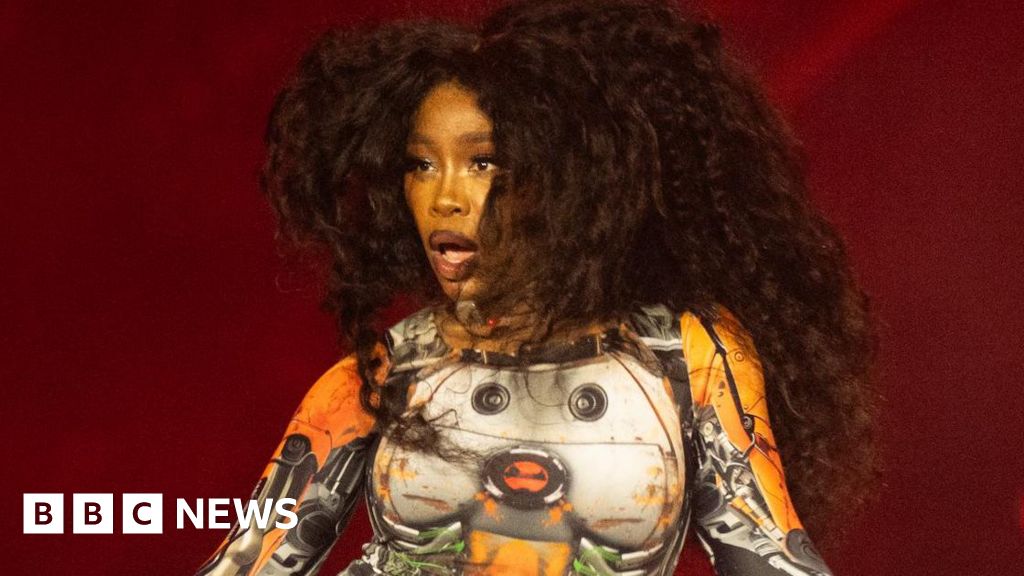ARTICLE AD BOX
By Mark Savage
BBC Music Correspondent
Image source, Getty Images
Image caption,Betty Boo: 'I'm making up for lost time'
In the Smash Hits' 1991 yearbook, Betty Boo delivered her top three tips for becoming a "rap sensation".
- Don't look like any other pop star
- Wear a tough leather shorts suit
- Go back to being a sap after about five minutes
At that point, she was Britain's best pop act. Her colourful collision of 1960s trash culture references, gold-plated choruses and helium rapping sounded like nothing else on the charts, while her attitude - simultaneously playful and assertive - was an early prototype for girl power.
She was born Alison Clarkson, a Londoner with Scots/Malaysian heritage, who dropped out of school to perform hip-hop and spray graffiti around west London (her tag, Ali Cat, could still be seen on the London Underground years after she became famous).
By 1990, the title of her platinum-selling first album, Boomania, had become a self-fulfilling prophecy. Fans adopted her severe bob haircut and Emma Peel catsuits, while Madonna offered her a US record deal.
Warning: Third party content may contain adverts
But after a period of writer's block and a poorly-received second album, she disappeared for almost a decade to take care of her mother, who was terminally ill.
In the early 2000s, she re-remerged as a songwriter for hire, working with Paloma Faith, Girls Aloud and Rod Stewart - and winning an Ivor Novello Award for Pure And Simple, the song that launched reality TV stars Hear'Say.
Now, Clarkson is ready to resurrect her pop alter-ego.
Last weekend, she premiered the poptronic new single Get Me To The Weekend on BBC Radio 2. The response overwhelmed her.
"It's been 100% positive feedback," she beams in a Zoom call from her home in Wiltshire.
"There were no haters or people saying, 'What are you doing? You're in your 50s, you old bag'. It was just people going, 'Oh my God, I'm so glad you're back'."
Supermarket sweep
So what persuaded her to re-do the do?
"I was approaching my 50th birthday and I thought, if I don't do it now, when am I going to do it?"
Lockdown played a part, too. Freed from her day job producing music documentaries, Clarkson's muse returned in the unlikeliest of places.
"Remember the days when only one person was allowed in the supermarket? My husband would go and get the shopping and I'd wait in the car. And during that hour, I'd come up with ideas in the Sainsbury's car park."
By the end of last year, she had been on enough shopping trips to come up with enough material for two albums.
"My plan is to just keep putting out singles," she says. "I'm making up for lost time."
Image source, Sandro Hyams
Image caption,The star now lives in Wiltshire with her film-maker husband Paul Toogood
The Betty Boo story begins, as all good stories should, with a burger.
It was 1987, and Clarkson was walking home from a Public Enemy gig in Hammersmith, when she spotted band member Professor Griff in McDonald's, ordering a Filet-O-Fish.
Full of teenage bravado, she approached him with two schoolfriends and declared: "We're rappers too!"
The trio - known as the She Rockers - proceeded to freestyle for him while being ushered out of the restaurant by an unimpressed employee. (Amazingly, Griff had a documentary crew following him and the footage is on YouTube.)
Warning: Third party content may contain adverts
That chance meeting prompted an invitation to the US, where Griff produced the She Rockers' debut single Give It A Rest.
"That trip was an apprenticeship," Clarkson recalls. "I left my A-Levels, went to New York and toured with Public Enemy.
"We were really young and completely fearless. My mum must have worried so much about me."
But by the time they returned to the UK, Clarkson had grown tired with the She Rockers' sound.
"I realised that, actually, I like pop music," she says. "I wanted to try and write pop-rap and they wanted to stay a little bit more underground."
School daze
Her breakthrough came when The Beatmasters asked her to rap on a clubbed-up cover of Martha And The Vandellas' I Can't Dance To That Music You're Playin'.
"I went to their studio, spit a few lyrics, and the next thing I knew, I was on Top of the Pops," Clarkson recalls with a giggle.
When the song hit the top 10, she used her royalties to buy a keyboard and a sampler, and started writing songs in her bedroom.
Straight away, she came up with Doin' the Do - a catchy-but-withering put-down of a maths teacher who had advised her to become a secretary.
"Going to be comprehensive school during [Margaret] Thatcher's time in the 80s, the teachers weren't being paid properly. I had aspirations to do well in my studies, and they just weren't interested at all.
"So I thought, as I broke out of school, that the only way I could express myself was by putting it on a record."
Warning: Third party content may contain adverts
The video for Doin' The Do channelled her rebellious streak, with Boo strutting around a school corridor in a leather jacket and hotpants, leading the pupils in a mini-revolution.
Fizzing with attitude and humour, it stood out in a year where the UK's biggest-selling singles were depressing ballads like Unchained Melody and Nothing Compares 2U.
"I always wanted to be a bit larger than life because I'd done the hip-hop look, with the troop jackets and the Adidas high tops,"she says. "In a way, I just wanted to dress up and be different."
The space-set video for her follow-up single, Where Are You Baby, was even more adventurous, with Boo riding a rocket to the moon in a purple spandex jumpsuit. Critics compared it to Jane Fonda's sexually-charged sci-fi flick Barbarella, but Clarkson says she was really aiming towards the clunky US TV series Land of the Giants.
"I liked that because it was really quite tacky," she says. "You could tell it was all Fairy Liquid bottles instead of rockets."
That combination of home-spun charm and kitsch melodies propelled Boomania to platinum status and earned Clarkson a Brit Award in 1991 (she says organisers told her she'd won three "but they must have changed their minds at the last minute").
Image source, Getty Images
Image caption,For reasons lost to history, Clarkson ended her Brit Award acceptance speech by declaring: "Long live Des O'Connor!"
She flew in for the ceremony from LA - a sign of how gruelling her schedule had become. She later confessed that the stress of stardom caused her to develop a "boil on the bum" that had to be lanced hours before performing live on Dutch TV.
But pop careers don't allow for downtime, and the quick delivery of a second album was deemed necessary. GRRR! It's Betty Boo duly arrived in 1992, but while it contains some beautiful flourishes (Hangover, in particular, invented country-rap long before Old Town Road), the public seemed uninterested.
"I couldn't see any reason why that didn't make more of an impact," she says. "But I think, possibly, I tried to become a little bit more grown up - when what went down well in the first place is the fact that it seemed really real and authentic.
"The chairman of Warner [Records] said, in hindsight, 'You became a little bit too Chanel'."
GRRR! did have one big fan, though: Madonna.
The star asked Clarkson to join her to her new record label Maverick, but the offer coincided with Clarkson's mother being diagnosed with cancer. The singer, who had only lost her father a few years earlier, decided her only option was to quit music.
"I didn't have the headspace to be a pop star," she says. "When you're grieving, you just don't feel like that person any more.
"But Madonna was lovely about it. When my mum died, she sent me flowers because she knew what it felt like to lose her mother."
Image source, Alamy
Image caption,Clarkson's stage name is based on the cartoon character Betty Boo - who she was said to resemble after a "disastrous" teenage haircut.
Clarkson spent her retirement playing tennis in a local league (she still trains every day) until an old acquaintance by the name of Simon Cowell asked her to mentor his new band.
"Basically, he turned down the Spice Girls and he was really sore about that, so he wanted to make another girl group," she says.
The resulting act, Girl Thing, never amounted to much - but they did record an early version of Pure And Simple, which was later given to Popstars winners Hear'Say.
Not that anyone thought to tell Clarkson...
"I was reading the News of the World the weekend that Hear'Say had won and at the bottom of the page it said, 'If you want to hear their new single, ring this number'," she recalls.
"And so I phoned it up and I thought, 'That's Pure and Simple! That's the song I wrote!' And that's how I found out."
Warning: Third party content may contain adverts
Still, the success established her as a professional writer, a job she juggled with side projects like WigWam, a short-lived collaboration with Blur's Alex James.
More recently, she took Betty Boo on the nostalgia circuit as "an elbow test" to see if fans were still interested. Spoiler alert: they were.
The concerts gave her the confidence to start recording new material, going back to her old practice of recording in the bedroom after the pandemic struck. "I kind of regressed into a teenage existence," she laughs.
Lockdown also inspired her comeback single's message of living for the weekend, "because the weekend didn't really seem like the weekend, did it?" she says. "Time blurred and it all just felt like one zoom call."
When her producer, Andy Wright, added a sample of The Human League's Love Action, it made the song unexpectedly emotional.
"My dad used to buy me records and The Human League's Dare was one of them," she explains. "I used to open the sleeve and look at the girls and go, 'I really want to get a wedge cut and put a beauty spot on'.
"So the song's like a homage to my dad, because he introduced me to that record."
Warning: Third party content may contain adverts
So, as she launches Boo 2.0, how does an older, wiser Clarkson feel about her advice to budding rap stars?
1. Don't look like any other pop star
"Yes, that's really important! I'm probably not as out there as I used to be, with the platform boots and spacesuits, but I still get my Boo on."
2. Wear a tough leather shorts suit
"Well, I spend most my time in tennis gear now. I look like a PE teacher, basically, but I still wear shorts!"
3. Go back to being a sap after about five minutes
"A sap? Ha ha! I remember, back in the day, Chris Evans saying he was scared of me. But I'm a mouse, really."
Follow us on Facebook, or on Twitter @BBCNewsEnts. If you have a story suggestion email entertainment.news@bbc.co.uk.

 2 years ago
22
2 years ago
22








 English (US)
English (US)